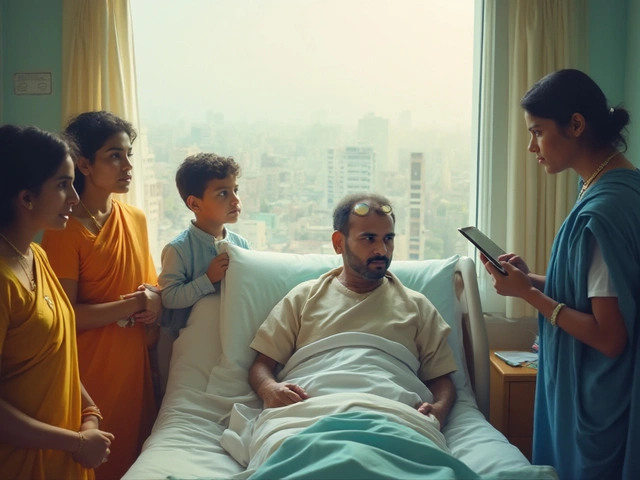
June 2023. A 62-year-old grandfather walks out of the ICU after heart bypass surgery and posts a selfie with his daughter, waving at his fans on Instagram—just five days after a procedure that would’ve laid him up for two weeks two decades ago. The look of surprise? Totally real. If you or someone you love is facing open-heart surgery, you might wonder: How long are you stuck in the hospital afterward? Does everyone bounce back at the same pace? Why do your neighbor’s stories sound so different—one stayed three days, another almost two weeks?
Understanding the Hospital Stay After Open-Heart Surgery
You might think open-heart surgery means a guaranteed long hospital stay. Decades ago, patients would spend weeks recovering under constant watch, but now, things look very different. Today, most people stay between four and eight days, with the national average for a standard coronary artery bypass graft (CABG) being about five to six days. Heart valve replacements or more complex surgeries can extend that timeline, but technology, surgical technique, and post-op care have all shortened the average hospital stay.
Let’s break down those days. On day one, you’ll wake up in the intensive care unit (ICU) surrounded by beeping monitors and a team of nurses and doctors focused on your heart rate, breathing, and pain levels. ICU time usually lasts for 24–48 hours as your team makes sure there are no immediate issues like infection, bleeding, or problems with your new or repaired heart parts. By day two or three, once you’re stable, you’re moved to a regular surgical ward. No more round-the-clock ICU care, but you’ll still have wires, IV fluids, and regular checks from nurses and doctors.
In the regular hospital unit, you’ll start standing up and walking short distances—sometimes as soon as the first day after moving out of ICU. Physical therapists might visit daily to get your muscles working again, which helps avoid blood clots and hospitals’ least favorite phrase: ‘bed sores.’ You’ll also start on breathing exercises with a spirometer (it looks like a plastic toy, but it’s dead serious for keeping your lungs healthy after anesthesia).
Check out this timeline showing the average number of hospital days after various open-heart surgeries (data from Mayo Clinic and Cleveland Clinic):
| Type of Surgery | Average Hospital Stay (days) |
|---|---|
| Coronary Artery Bypass Graft (CABG) | 5–7 |
| Heart Valve Replacement/Repair | 6–10 |
| Aortic Surgery (ascending/arch) | 7–14 |
| Minimally Invasive Surgery | 3–5 |
Of course, stats only tell half the story. Individual recoveries vary by age, other medical problems (like diabetes or chronic lung disease), how sick you were before surgery, and even how motivated you feel to move and eat afterward. Smokers or folks who struggled with heart failure before going under usually take longer. But people in their sixties and seventies are often up and around within a day or two when things go smoothly. For example, research from Johns Hopkins Medicine found that nearly 60% of bypass patients were home within six days, and some return home in as little as four, especially after minimally invasive operations.
One fact nobody tells you: the clock starts as soon as your surgeon feels confident your new or improved heart can keep up with daily demands outside the hospital. If you’re running a low fever, having trouble breathing, or your blood pressure dances around, expect a delay. But you won’t be kept “just for observation” these days—the pressure to discharge safely but quickly is higher than ever, and your insurance company is counting every hour you’re in a hospital bed.

What Factors Affect the Length of Your Hospital Stay?
This question gets every patient’s attention. Not everyone gets the fast track. Some get a detour. So, what actually slows or speeds up your trip home? Let’s break it down.
- Age: Older patients often heal a bit slower, sometimes facing more bumps like confusion (known as delirium), wound healing issues, or general fatigue. Families should pay close attention to older loved ones for signs of hospital-related confusion and help them reorient if needed.
- Pre-Existing Conditions: Got diabetes, poor kidney function, or breathing problems? The body needs time—and extra support—to handle new stress. Uncontrolled diabetes can cause surgical wounds to heal slower and raise infection risk, both of which can extend your stay.
- Type of Surgery: Traditional (open) surgeries with large incisions tend to require longer recovery than minimally invasive methods, which use smaller cuts and sometimes robotic tools. Valve replacements can take longer than simple bypasses, but new ‘transcatheter’ techniques are changing the game for some patients.
- Complications: Infections, bleeding near the heart, abnormal heart rhythms (especially atrial fibrillation, which happens in about one in three patients), kidney problems, or even just nausea from pain meds—all can slow you down. Hospitals have rapid-response protocols, but every hiccup adds hours or days.
- Mental State: Anxiety or depression before or after surgery can drag out recovery. Patients who join a support group or talk to a counselor often feel more in control and heal faster.
- Post-Surgical Mobility: How soon can you stand up, walk to the bathroom, and get in and out of bed with just a little help? Hospitals won’t send you home if you can’t walk safely or manage stairs (if you have them at home). If you live alone, the staff may want to make sure you’re eating, dressing, and managing bathroom trips without major trouble.
- Support at Home: If you’ve got family or friends ready to help with shopping, cooking, or daily tasks, doctors are more willing to discharge you early. For solo flyers, hospitals might keep you an extra day to arrange home nursing or rehab.
Sleeping patterns matter, too. Ever notice how hard it is to get real sleep in a hospital? It turns out, sleep issues after surgery are a real thing. Nurses wake you for checks, the noise never fully stops, and pain or worry can keep you up. Take earplugs or a sleep mask if you’re picky. Lack of good sleep slows healing and makes people more prone to confusion, especially older adults—and that alone can add a day or two to a hospital stay.
One more thing: pain management. If you breeze through pain—good for you. If not, nurses and doctors will work to balance pain relief (so you can move and breathe deeply) with the risks of grogginess and constipation that come from heavy-duty pain meds. Some hospitals now use enhanced recovery protocols (ask about them) with less reliance on opioids, helping people return home faster and more alert.
Keep in mind, there’s usually a “checklist” of things you must master before discharge. Can you get in and out of bed safely? Walk to the bathroom and back? Get up a flight of stairs, if you have them at home? Manage your medication schedule and understand which warning signs mean “call the doctor”? That’s the threshold for safe discharge—not some magic number of days.

Life After Discharge: Tips for a Smoother Recovery at Home
Walking out of the hospital isn’t the finish line—it’s the start of a different kind of marathon. The first few weeks at home bring their own challenges. Most folks feel better once they’re in familiar surroundings, but the real healing—muscles, lungs, stamina, even confidence—takes months. Why? Surgery interrupts just about everything: sleeping, eating, bathroom habits, energy, and mood. All of it needs time to get back on track.
So, what helps you cruise through the early weeks?
- Stick to Your Medication Plan: Always keep a written schedule, and use reminders so you don’t miss doses. Some meds prevent blood clots, while others help your heart adapt to the surgical changes. Missing doses can set you back.
- Monitor the Incision: Look out for redness, bleeding, or swelling. A bit of tenderness or a small amount of clear drainage is normal, but pus, worsening redness, or fever warrants a quick call to your doctor.
- Don’t Skip Cardiac Rehab: Almost every major hospital will send you home with a prescription for cardiac rehab—a monitored exercise and education program proven to lower risks of complications and help people regain strength faster. Some centers do hybrid telehealth sessions if you can’t easily travel. The American Heart Association says patients who attend rehab are 25% less likely to be rehospitalized.
- REST—but Keep Moving: Don't imagine you'll be bench-pressing in a week, but short daily walks—even inside the house—keep blood flowing and restore your confidence. Stand up every hour while awake. Use your spirometer several times a day to avoid lung infections.
- Eat Smart: Your heart’s been through a lot—aim for a Mediterranean-style diet, with plenty of leafy greens, nuts, and fish. Avoid salty prepackaged foods and keep caffeine and alcohol to a minimum.
- Watch Your Mood: Feeling sad, restless, or irritable after major surgery is shockingly common. Share what you feel with your support system, and talk to your doctor if these feelings stick around—a lot of people benefit from short-term counseling or antidepressants after heart surgery.
- Keep Wound Supplies Ready: Your hospital may send you home with a stash of dressings or even sterile saline for cleaning. Before discharge, ask for clear written instructions—and set alarms to remind you about wound checks and medicine times.
- Know the Red Flags: Sudden chest pain, trouble breathing, fever above 38°C (100.4°F), oozing or opening of your incision, or a racing or irregular pulse? Call your surgical team. Serious complications after discharge are rare but always better caught early.
- Arrange Transportation: You won’t be driving for at least four to six weeks (even longer for those on strong pain meds). Have a family member or ride service lined up for follow-ups or cardiac rehab sessions.
The biggest tip? Don’t judge your recovery by someone else’s. Everyone knows the guy who ran 5 kilometers in three weeks—and the one who still napped twice a day two months after surgery. Your discharge date doesn’t decide whether you’re ‘strong’ or ‘weak’; it’s just a snapshot. Try to celebrate milestones: first walk outside, first shower by yourself, or the first day you finally forget about your incision for a few hours.
And yes, you can expect plenty of check-ins once you’re home. Nurses or home therapists may visit, or your hospital could use an app to get daily updates on your weight, wound, and pain. Missing or ignoring these check-ins is a quick way to get re-admitted—so stay on top of them, and tell your team about any new issues or worries, no matter how small they seem.
The hospital stay after open-heart surgery may be shorter than it used to be, but the journey isn’t a sprint. You get one heart—take your time, follow the steps, and let your recovery surprise you for all the right reasons. If you have questions before or after surgery, don’t guess—ask your doctor, your nurse, or your rehab specialist. And remember, progress shows up in small steps before it ever arrives in big leaps.





Rohan Talvani
I am a manufacturing expert with over 15 years of experience in streamlining production processes and enhancing operational efficiency. My work often takes me into the technical nitty-gritty of production, but I have a keen interest in writing about medicine in India—an intersection of tradition and modern practices that captivates me. I strive to incorporate innovative approaches in everything I do, whether in my professional role or as an author. My passion for writing about health topics stems from a strong belief in knowledge sharing and its potential to bring about positive changes.
view all postsWrite a comment